https://www.gofundme.com/f/living-the-dream-or-nightmare-help-me-tell-all
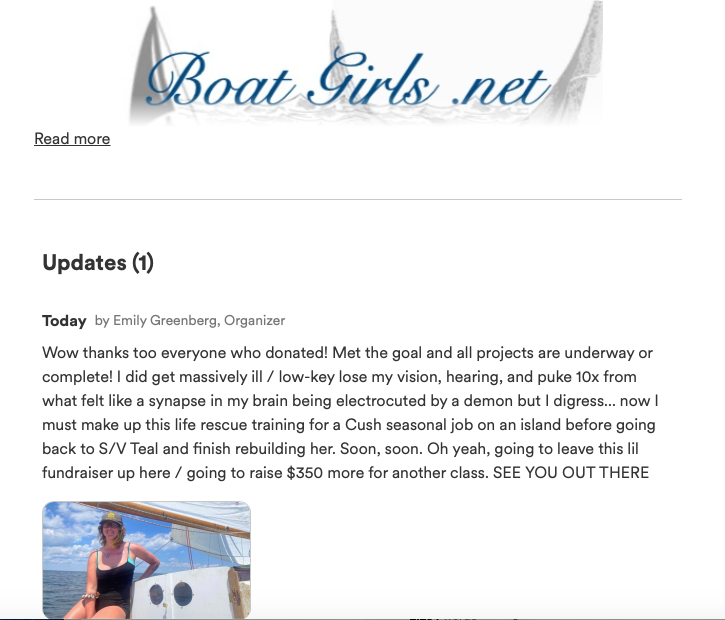
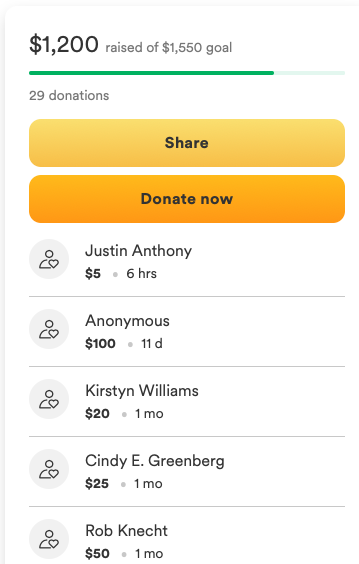
https://www.gofundme.com/f/living-the-dream-or-nightmare-help-me-tell-all
SOS! HELP ME TELL MY #METOO STORY, REBUILD MY BOAT, AND LAUNCH AN ONLINE NEWSPAPER DEDICATED TO SAILING & THE MARINE INDUSTRY SO NO GIRL EVER HAS TO GO THROUGH WHAT I DID JUST TO GET ON BOATS (full story here)

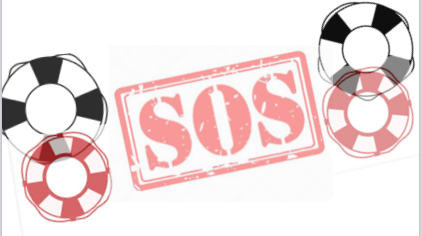

I wrote a story once about my friend Logan and their old boat with its custom wooden spars and self swaged standing rigging. Among other sailor punk repairs that were solid as fuck but didn’t buy into the marine industrial complex, the boat also had a rich history. Nearly all of that was due to Rebecca Rankin, or Capt. Becca. Turned out that some of the facts in my story about her once-boat, Dolphin, were incorrect—and she reached out to tell me so.
I got defensive, of course, and (not soon enough) saw her side. I apologetically promised to make the proper corrections. While it was uncomfortable to hear some criticism about myself and my work, I in turn gained a glimpse into this woman’s remarkable life journey.
She’s an accomplished solo sailor, a finisher of the venerable engineless Race to Alaska, an artist, cancer survivor, and a student at the Maine Maritime Academy. Oh yeah, she’s also a talented visual artist.
Capt. Becca got into sailing on a whim, and it changed her life forever…

Tell me about your boat, Dolphin.
Oh my goodness, Dolphin. Well, to begin I bought Dolphin when I was about 21 years old. I am 33 now. We had travelled to the Florida because my boyfriend at the time, and I, were cold. It was winter and we lived in my Volvo station wagon. Key West, Florida was the farthest south a body could go without a passport so…off we went!
I had some money left over from my grandmother’s inheritance and he mentioned this idea of living on a boat….and I was like, “that sounds neat!” So, we looked at Dolphin and two other boats and then purchased that little 28’ sloop for $6500 on Stock Island, Florida.
We did SO MUCH WORK TO HER. Things were always breaking. For example, a couple weeks after we bought her and before I had even sailed her, the forestay parted during a storm and the rotten mast boot kicked out and she dismasted. I was trying to learn to re-rig a small sailboat before I’d even been sailing. By the time I finally sold her to Logan, I had touched every single square centimeter of that motherfucker, probably twice.
I did sell her twice, first to my friend Brenna, after single-handing back from Guatemala and having a hell of a time of it. Then I bought her back. Because why? I don’t remember. Either way, I spent eight months in a boatyard and then sailed her from Key West to New Orleans where I lived for a while then decided to “pursue a career” and sold her to Logan in order to go to school. I don’t know what years anything happened. I’m not terrific with a sense of time, but I think I owned her, on and off, for about eight years.
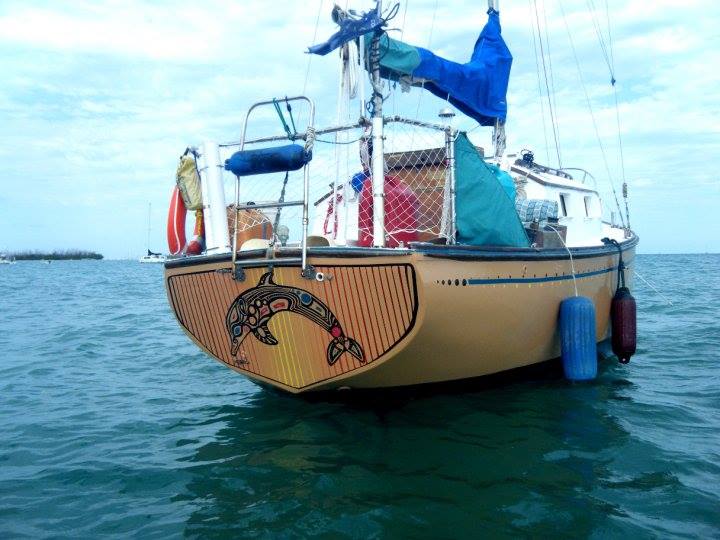
What is the most terrifying thing that happened to you at sea?
Ha! Oh, Gosh. I suppose when I did my first big single-handed passage from Key West to Isla Mujeres, Mexico. I was using this kitchen egg timer to wake myself up in 10 minute intervals while I sailed through a shipping channel at night. I didn’t have any sophisticated electronic equipment onboard cause I was broke. I learned that 10 minutes is sufficient time for a very large freighter to steam from invisible to about three stories directly above your head as she passes directly perpendicularly in front of your bow in the middle of the night… you know those experiences where instead of being utterly, completely fucking dead you’re instead absolutely fine? That was one of them. That ship was so close to me I couldn’t see her top decks without craning my neck, but she passed right on by and into the night and I, and Dolphin, were completely fine. Stunning, that much is for certain. And the stars were so bright.

What kind of boat do you have now? What kind of work does it need? What are your future plans for the boat?
Today, I have a steel 38’ yawl named Cu Mara, which is Gaelic for “Sea Hound.” She was built in Ontario, Canada in 1975 by a gentleman named Al Mason and lived there most of her life until my friend Robin transported her to Maine about six years ago. I bought her, and have moved her only by truck all over the state of Maine. I purchased her prior to my acceptance to Maine Maritime Academy and have been rather forced to put my aspirations for her on the back-burner as I work through school, but I hope very much to see her sailing, hopefully to a foreign country, in the not so distant future. She has been sitting out of the water for many years now so every system requires a general go-over, but she is a steel vessel who has never been immersed in salt water so she is, generally, in remarkably excellent condition for her age.

You said to me once you are in school at Maine Maritime because you want to be a better captain. What is an example of a time you’ve been a good captain? How about a bad one?
Certainly, that time I fell asleep at the helm and was awoken by the sound of crashing breakers, had a moment where I was thankful I was at the beach, then realized I was sailing at 6 knots directly into the shore so pirouetted around without even waking my crew of two was an example of my less-than-illustrious captaining abilities. That was off the East Coast of Belize and, since we didn’t crash nor die and no one else even woke up, it might qualify as a “good captain” moment as well. I’m torn.
But yes, I am at school at MMA because I have zero “official” knowledge of the ways of the sea. Despite my experience, I have no formal knowledge of things like navigation and, so, especially in the world we find ourselves now, I am working to improve my knowledge of all things maritime in the hopes that I will be a stronger and fairer captain in the future, assuming I can actually handle the responsibility. I’m a single-hander at heart for eternity, most likely, and a reluctant captain at best. I just want to make wise decisions and sail to exotic lands without crashing into things, what can I say?

You competed in the 2019 Race to Alaska and finished! What was that like? What kind of boat? How did you end up as crew?
I did! It was fucking dope and fascinating as all hell! What a crazy little micro-universe, cult type thing they have going on surrounding the R2AK. Such a kooky event. So many awesome people. So weird! The boat we sailed on was an F-27 trimaran named Magpie, one of those folding, trailerable deals and we sailed with a crew of three. My captain, Katy Steward, literally just texted me one day and said, “Hey, you sail right?” She says, now, she thought of me because she needed another hand she could trust to stand watch alone and, even though we had never met, she figured I could handle it. We’re real close now, she’s fucking amazing. Obviously, I was available and said “yes,” which is the first step in any real adventure, after all.
What were some of the negative experiences of R2AK?
There wasn’t any wind so we pedaled that goddamn trimaran across a whole lot of bodies of water. I’m not a racer, so I’m not particularly inclined to go places as fast as humanly possible, especially when it doesn’t make any damn sense to do so, so I struggled with that a bit. I was also intriguingly disturbed by the media attention the R2AK and R2AK racers receive, but that’s more of a reflection on me and my discomfort in the spotlight than anything else.

In both the sailing community and marine industry women are in the minority. What kind of sexism have you faced and how have you overcome it?
I have a number of terrifically specific personal experiences, like being dropped from the program at Piney Point for no reason whatsoever, but it’s sometimes personally difficult to separate the experiences I have from the appearance of my gender and the appearance of my tattoos. I am heavily tattooed and believe this to be an equally affective experience in regards to my career, sometimes even more so than the fact I am a woman. I must say, I also stand 6’1” tall, taller than most men, and so have not felt the effects of sexism as directly as many of my smaller, female counterparts. I discern it has something to do with the perception that I can’t be as easily fucked with, so men don’t treat me as less than equal as much. Obviously, discrimination is still a huge part of everything I experience. This is not the maritime standard I hope to see in the future. Sitting with the unbelievable sexist and discriminatory aspects of this industry is incredibly difficult. We are one of the most patronizing and mentally antiquated industries out there. I can only hope that, by continuing forward with my career and intentions, I am part of the solution, rather than part of the problem.

So you’re a fucking survivor and I hope you don’t mind me asking about it. What kind of cancer did you have? How old were you when were you diagnosed? What was it like navigating the healthcare system as a young woman with no insurance?
Yeah, fuck yeah I am! I don’t mind your asking one bit! I was diagnosed with Stage III Ovarian dysgerminoma in July of 2016, at age 30, after having my right ovary, fallopian tube and 26 lymph nodes removed in an emergency surgery after the tumor inside my ovary grew so large it eclipsed my bladder. That sucker was about eight pounds. I underwent 6 months of BEP Chemotherapy, which is a rare but highly effective type of chemotherapy, and have been in remission for about three years now. There is zero history of cancer of any type in my family.
Navigating the healthcare system as a young woman with no insurance was fucking insane. I do not recommend it to anyone and find it incredibly embarrassing that THIS is the point to which we have evolved, societally. Y’all need to get your shit together and re-align your priorities. No person ACTUALLY DYING should have to rely on a friend she hardly knows to feign being a doctor so that she can get the medical attention she requires to NOT DIE in America. It’s a real fucking tragedy. It was about a year, or maybe two, post treatment I could even go IN a hospital without crying. It’s absolutely unbelievable.

How has surviving from cancer altered the course of your life?
It has changed my life, completely, as I know it. I am not the same person as I was prior to illness and treatment. For one, I have a lot of lingering physical issues, like Raynaud’s disease in my feet and hands, PTSD and memory issues that are direct results of chemotherapy treatment but, MORE SO, I was forced, by my illness, to finally fucking show up for myself. I learned about boundaries, my needs, my body and my heart in a way that is reserved for cancer survivors. Its difficult to explain, but not a day goes by I don’t consider that event in my life. Its precious, man. Every second is precious. Anyone who tells you otherwise is a liar cause the only thing I really know is that you really never, ever fucking know.

You’re also an artist, how would you describe your art?
My art is fucking beautiful. For many years, it was my primary source of income. I don’t think I produced the best work I could have due to this dependency, but produced I sure did. My art is a direct expression of myself and it is raw, real and unique, just like me. I have no training, besides what my mom taught me, cause she’s a badass artist, and, so, the result is actually original. It took me awhile, but now I can dig that THAT is amazing and priceless. My art isn’t for everyone, but so what.
How can people buy your art or support you in some other way?
Hell! I have a lot of various websites you can see my art, I sell a lot of original pieces through my Facebook and Instagram. I have goals to publish some books and keep creating in the future and you can always just VenMo me money for no reason at all. It’d be great to start a Patreon, but I need to identify a project I feel worthy, first!
What’s next for you and how can we watch?
The goal, currently, is to make my way, at least semi-successfully, to graduation from the Vessel Operations and Technology Program at Maine Maritime Academy. You can find me on Facebook and Instagram and message me any ole time about any ole thing.
Melanie Neale, a certified USCG captain, licensed yacht broker, and published nautical writer was sexually assaulted as a teenager by a visiting yachtsman, while living on her parents 47-foot-ketch. This is her story.
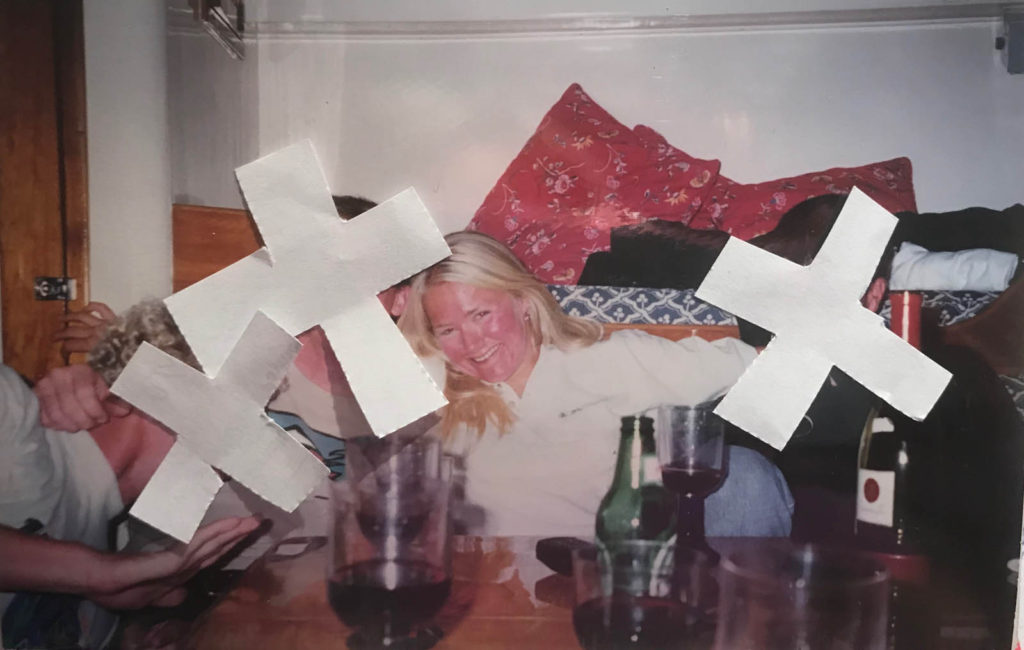
It was 1995, the first year we ventured north of the Chesapeake Bay on the Gulfstar 47 that my family and I lived aboard. Or maybe it was 1994. I don’t really remember. I was 14 or 15. You see, sometimes we remember the essence of things without remembering the exact details. This is something that I’ve stressed in every memoir writing class I’ve taught and in every memoir I’ve edited (including mine). The devil may be in the details, but the what remember is how the event made us feel.
Whatever year it was, we were docked at the Trump Marina in Atlantic City. Oh, how appropriate that seems now! We’d run into bad weather on the stretch from the Delaware Bay to New York, and had made an unplanned stop. We usually didn’t stay at marinas, but there’s really no place good to anchor in Atlantic City, so Mr. Trump got our money.
It was the first time I’d seen the inside of a casino: the dramatic overstimulation of flashing lights, the withered men and women whose hands were stained from the quarters they continuously dropped in the slot machines.
I don’t remember the year. Does it matter?
I walked with my dad past the shiny yachts on the way to pay our bill for dockage. “I want to get my captain’s license,” I told him. It was the first time I’d really ever expressed my desire for a future in the marine industry. The uniformed captains and crew on all the yachts we saw on a daily basis seemed so healthy and happy and vivacious.
“You don’t want to do that. The only way women make it in the marine industry is to sleep their way to the top,” my dad said. My dad, boating magazine guru, leader of the starry-eyed cruisers who gathered to hear him speak at boat shows, saw no future for me in the industry. Unless I slept my way to the top.
You think of all the comebacks years later. All the things you should have said. You imagine different interpretations—maybe it was a warning about the rampant sexism in the industry. Maybe he intended for it to be a way of protecting me from what he believed would be a difficult future. But he said what he said and I may not remember all the details, but I remember.
A few years later, I was working on a beautiful 78’ wooden schooner for the summer, taking tourists out for day sails around Narragansett Bay. It was the perfect summer job. I could get sea time towards my captain’s license. I was outdoors and physically active. The money was great. I learned that my tips were better if I wore shorter shorts and really jumped and heaved when I was pulling the heavy gaff-rigged sails up. Jump, brace feet on the mast, heave. Jump, brace, heave. Could I tell you what shoes I was wearing or what the captain’s name was? No. But I remember the jump, brace, heave…and the overflowing tip jar.
A charming captain came into town aboard a large Oyster. He was British and oh, the accent! He wore crisp white shirts with the boat’s name embroidered on the breast. He paid attention to me. Once he had his crew drop him off aboard the schooner while we were fully under sail, chasing us down in the center-console inflatable so he could do a flying leap aboard the schooner and spend the afternoon with me. The grandiosity of it!
Did I want to sleep with him? Of course I did. Did I really understand what he wanted? Of course I didn’t.
I went to a party that night on his (or his owner’s) boat. There were blonde and wind-tousled sailors from New Zealand, South Africa, and all over the place. There was free-flowing wine and a dinner professionally prepared by the chef of another yacht nearby.
At some point in the night, I was given a shirt with the vessel’s name embroidered on the breast. I have a photo of this night—the shirt, the blonde British guy, the sunshiney faces of the young sailors. I was given the shirt, but only on the condition that I swap my own shirt out for it while sitting right there at the salon table. So I did. I was ballsy and brave and drunk on both the wine and the attention of the captain. If you look at the photo, see the booze on the table, and read my body language, I was certainly asking for it.
I don’t remember what happened after the photo was taken. I woke up naked in a small berth with the captain on top of me. Someone opened the door. I think someone took a photo. I will never know.
I still lived at home. Aboard. I took the dinghy home from the party and climbed into the cockpit of my parents’ boat. Disheveled, missing my bra, with the shirt on inside-out. And just like many other details, I don’t remember what was said when my parents greeted me at the companionway. But I remember the essence of it: blame and guilt.
A few days later, I mustered up the guts to dinghy up to the captain’s boat to ask for my bra. He promptly handed it to me across the lifelines, saying, “I don’t know what you think, but I don’t have time for a relationship.” Not only had he assaulted me, he then turned it around to make me seem like I wanted something more.
I saw him a few years later when I was working in a nautical book and chart store in Ft. Lauderdale. Anger boiled in my belly and rose up to my face, which I’m sure was red when I said, “Hello, how are you?” like nothing had happened and he replied politely like nothing had happened.
Like Dr. Ford, I don’t remember the details. I couldn’t tell you even what month it was. But that doesn’t make it any less meaningful. I was drunk. I changed shirts in the middle of the salon. Maybe I was even subconsciously trying to “sleep my way to the top.” But that doesn’t make what happened right.
I truly believe that this happens in the marine industry much more often than it does in other industries. A friend told me about someone who was sexually assaulted by the owner of a boat she was crewing aboard. Halfway across the Atlantic Ocean. Where was she to go?
Think about it. This industry is still primarily dominated by men. There are lots and lots of good men, and there are lots and lots of women who lie, and lots of good women and lots of men who lie. But in an industry where female crew are still commonly referred to as “stewardesses” and are often quite literally stuck at sea with their male counterparts, it’s no surprise that #metoo at sea is a Pandora’s Box that’s about to explode all over the place. We need women to come out with their stories.
My dad may have been aware of the increased risk of assault when he warned me that women in the marine industry often “slept their way to the top.” It may have been his way of warning me not to “put myself” in a position where assault was more likely. But it was, in every aspect, the wrong way to communicate, since it took all responsibility away from the men (quid pro quo, anyone?) and laid all of the responsibility on women.
I’m angry. I’m angry a lot of things. I’m angry that this happened to me and angry that the same thing, and worse, has happened to so many of my sailing sisters. I’m angry that I’ve allowed other people to mess with my psyche for so long. I’m angry that I’m almost 40 and I’m still hurt almost every day by this experience.
I also have mad respect for many of the men and women I know in the marine industry. Men who would never rape, and women who achieved their stations through integrity and hard work. The majority of people fall into these categories. The majority of people are good.
Women don’t come out with their stories because we have spent our lives wondering what people will think of us. Will we be called sluts? Will we be told that we brought it on ourselves? It’s no wonder that these stories stay buried within us. We are raised to believe that our value is based on what other people think of us. This is the single most harmful belief that women (and men) have. It goes far beyond sexual assault. It finds its way into all of our choices—whether we go to college, what we go to college for, whether we overextend ourselves financially by buying the house, whether we are good or bad parents, whether or not we have chosen appropriate partners. We care too much about what other people think, and we often make decisions that are extremely destructive to ourselves by going along with what we think other people want. Like not telling our stories and letting them grow so big inside of us that they take over who we are. We become angry. We become victims. We lash out.
Please tell your stories. They are vehicles for change. Tell us what happened, how it shaped you, and how you overcame it. Tell potential predators that they are no longer safe. Please join us in the #MarineIndustryMeToo movement.
I just want to take a quick moment to pay homage to one of the original sailing anarchists. Moxie Marlinspike. He created the documentary Hold Fast, where he and two friends buy a derelict boat (which probably should have been free), fix it up and take off sailing across the Gulf Stream. They are on a bare bones budget with bare bones equipment when it comes to sailing and filming. They literally use bags full of bricks at one point for secondary anchors.
What’s so great about Moxie and his crew are they’re literally the antithesis of the “yachtie,” which is really just a club for the good old boys anyway (which was recently exemplified by our friends over at sailinganarchy.com). Moxie started the Blue Anarchy Sea Collective which had self-steering guides, a telegraph for other sailor punks to keep in touch, a not a yachter cruising guide, and more. Unfortunately, the website is no longer active but here is an interview from 59 North magazine about where our hero Moxie is today! You can also read some of Moxie’s sailing stories over at his website.
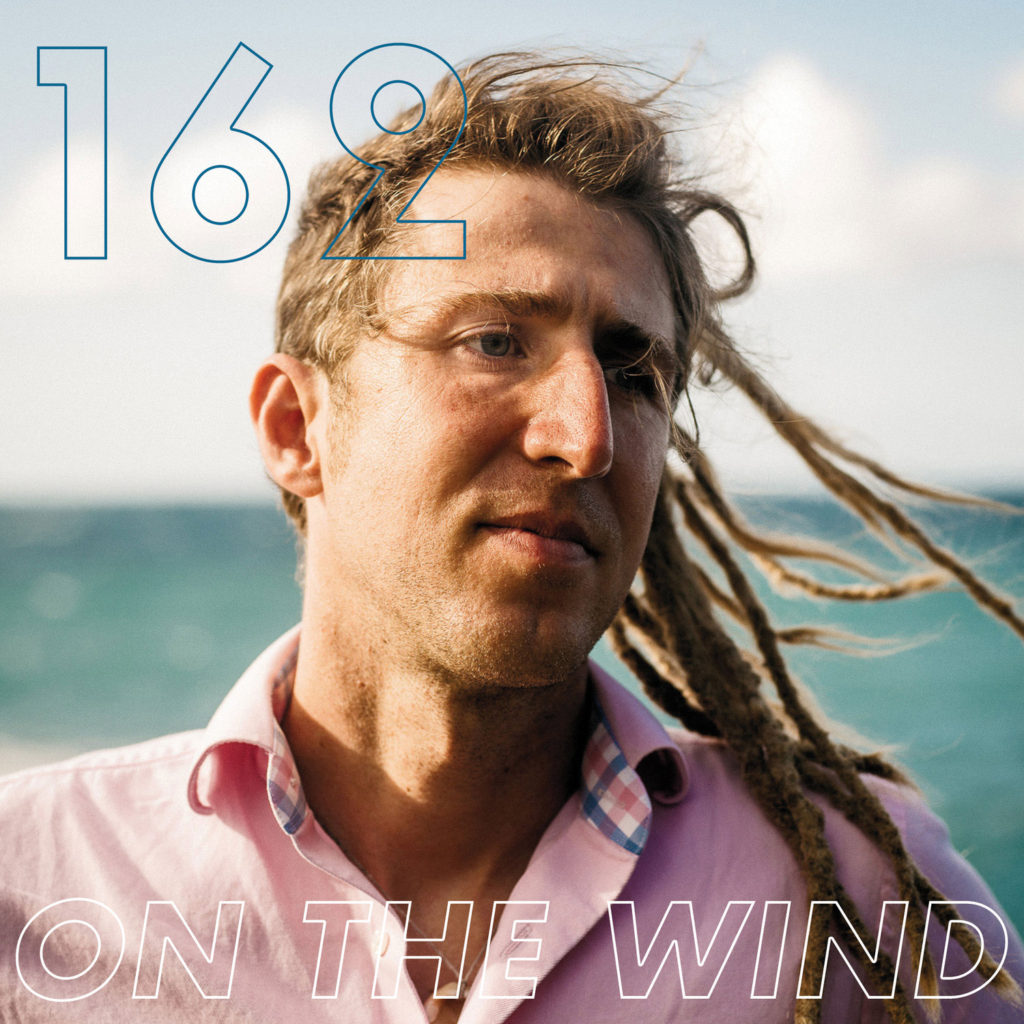
https://www.59-north.com/onthewindpodcast/recycled-moxie-marlinspike
A huge thank you to everyone who read, shared, and commented on my post Why You Should Stop Reading Sailing Anarchy(.com) . The post has been shared so many times and there are hundreds of comments pouring in all over social media! Someone posted some negative stuff about me on the Sailing Anarchy forum and I am grateful for that too, because it’s driving even more traffic to my site. The post has been viewed several thousand times thus far, so thank you to all my followers, and my haters. I’ve literally never been so popular or so hated.
Last but not least it seems that the SA publisher is not pleased by my post, and sent me a threatening email. The good thing is that bitches be mobilizing all over who are tired of SA’s sexist nonchalance.
“You can’t beat women anyhow and that if you are wise or dislike trouble and uproar you don’t even try to.” -William Faulkner
So apparently there was this cool sailing race in Russia, where this badass sailor featured below was participating. But that’s all I know because the popular website Sailing Anarchy, posing as a sailing news outlet, chose not to include any information about the sailor, the boat, or the race. In fact, they didn’t even use this photo featured here. Instead they used a photo from astern when she tipped her boat and had to maneuver herself back into it. The photo reveals quite an act of clambering, and quite the feat of athleticism. But that’s not all that it revealed.
Not only did the angle of the photo reveal this sailor woman’s buttox and crotch area, but the context in which Sailing Anarchy published it (and then their response when people expressed opposition) revealed a sexist agenda that promotes a male first environment within the sailing community, and a publisher that refuses to take accountability for discriminatory content.
The photo in itself is not discriminatory at all. The subject is doing something pretty awesome that requires skill and the frame absolutely captures that. Plus, the female form should not be banished because men are unable to control themselves from sexualizing it. But Sailing Anarchy posted that photo by itself, with a sarcastic caption. It was posted under a type of reoccurring “series” on Sailing Anarchy, tagged as “SCOTW” which seems to be the publisher’s kind of photo of the week. This category regularly demeans women sailors and propagates an environment where women are not welcome to participate as equals to men, but as subjects to be gawked at where their worth as humans (and as sailors) is measured by how they look.
There are several accounts of lewd comments surrounding female sailor content written all over the Sailing Anarchy “news” feed and the forums. In the instance of this particular post, many women and men wrote in expressing why they felt the context of the photograph was wrong. Some even tried to open a conversation and ask why. The problem would be so easy to fix. Simply stop posting photos and stories of women where their bodies and what their bodies look like is the main focus.
In between insults hurled at me personally, the publisher’s only defense to my question of why was there no mention of the sailor’s name, race, class, etc., was “The photo was submitted.” However upon further investigation it’s very clear to see that the race coordinators are active on the thread for this featured photo, and they can be seen asking Sailing Anarchy if they would include some actual info about the race in the post.
Sailing Anarchy officials chose to respond to comments protesting this type of sexist content by using derogatory slurs for the word vagina, calling protestors psychotic, and otherwise personally attacking anyone urging for a more equal rights approach to content surrounding women.
The definition I’ve always liked to use for the word anarchy is “the ability to be so free that you are ungovernable.” Sailing Anarchy is a bastardization of the word. Real anarchists are freedom chasers. They are freedom fighters. They are allies. And they will speak up when there is discriminatory content. Sexist discourse is hate speech, and I wonder what Sailing Anarchy’s sponsors would think of that?